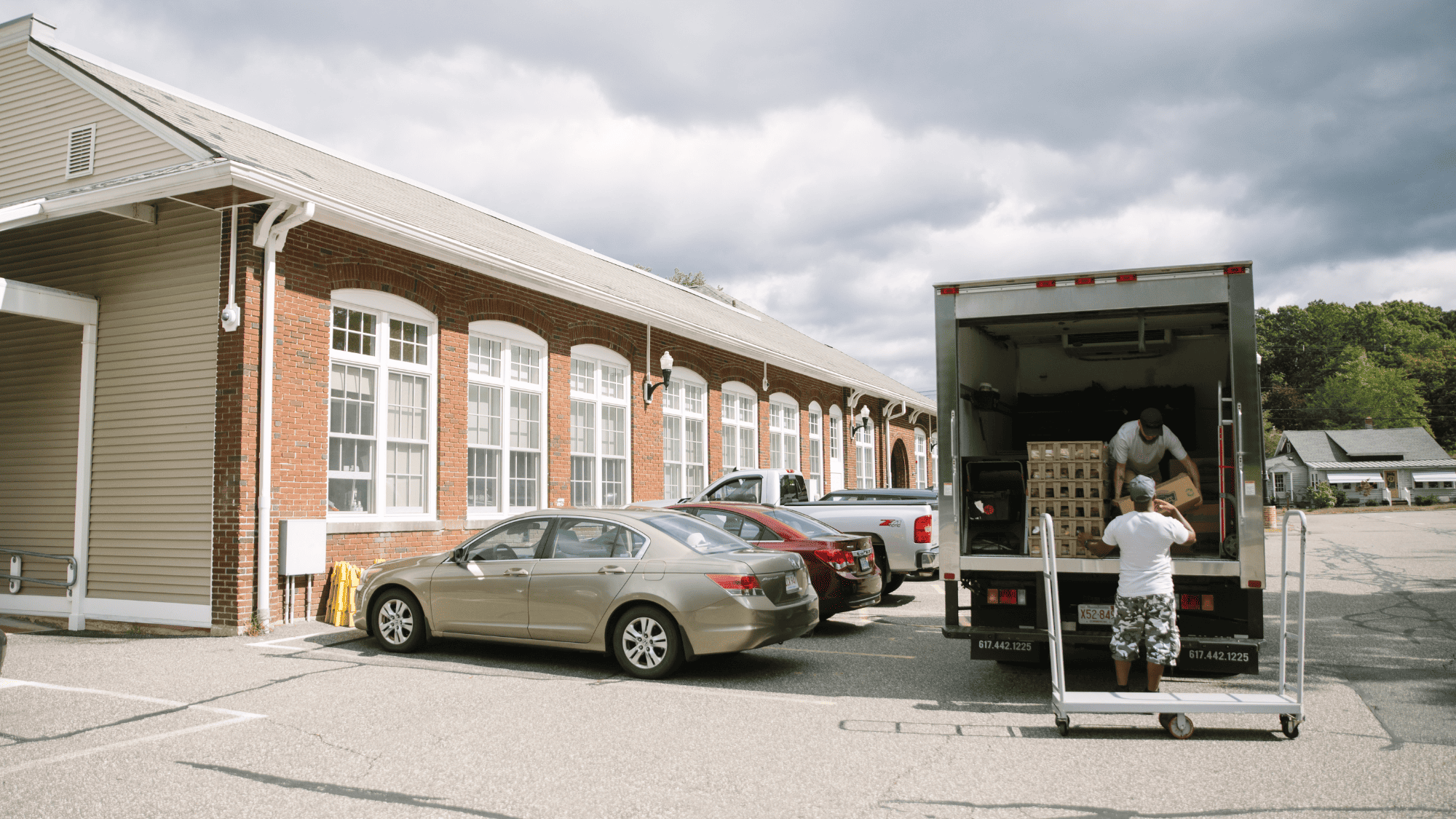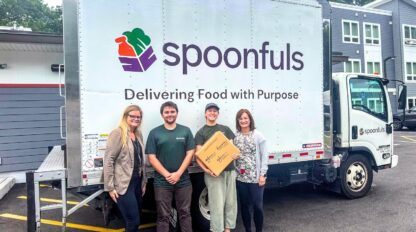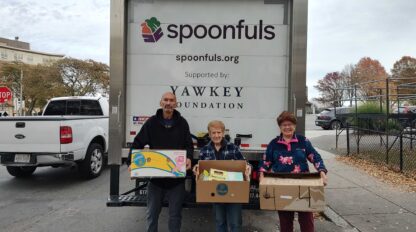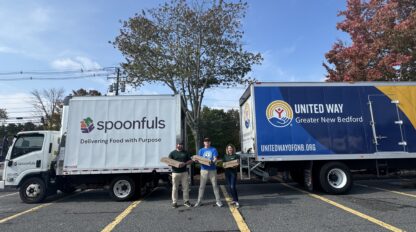Spoonfuls Spotlight: The East Longmeadow Food Pantry
July 11, 2023
Updated: May 21, 2025
Spoonfuls is the largest food recovery organization in New England. That’s in terms of geography, pounds rescued, and people served. Our partnerships with food retailers, nonprofits, and community organizations across Massachusetts are key, enabling us to recover and distribute more than 4 million pounds of food to people who need it most each year. In short, we can have a bigger impact when we work together! (You can read lots more about how we work here.)
Among our valued partners is The East Longmeadow Food Pantry. Learn more about our partnership, and the impact we have together, through our interview with Beth Baron, Food Pantry Coordinator at The East Longmeadow Food Pantry.
u003cstrongu003eWhat does your food programming look like at the East Longmeadow Council on Aging?u003c/strongu003e
Our food pantry is situated in the East Longmeadow Pleasant View Senior Center, but we serve the entire community of East Longmeadow, people of all ages! We’ve grown over the past few years, too. In addition to a traditional pantry, we have a mobile delivery van, which helps us deliver food to people who are homebound. This has been huge for helping us reach people without cars, who are recovering from surgery, or otherwise have a unique circumstance preventing them from visiting the pantry in person.
How have you seen access to fresh, healthy food make a difference for the people utilizing the pantry?
This is an important question. I used to teach about local, fresh, healthy, food, and know how critical it is. And for this pantry, it’s been amazing. Canned items are often higher in sodium and have lower nutritional value, so when you can build out someone’s menu by offering fresh produce and meat, it makes a difference – especially for our many clients with hypertension and type 2 diabetes.
We schedule our client pick-ups and deliveries around when Spoonfuls drops off, too. Spoonfuls comes Tuesday morning, and we try to have all the food out to our clients Tuesday afternoon and Wednesday morning. Because we’re receiving perishable items, we want to get it to our clients as soon as possible.
Jon and Rich [Spoonfuls Food Rescue Coordinators] understand our unique needs, too. They know, for example, that bigger, whole fruits aren’t great for our clients. Many are older adults dealing with mobility issues, so chopping can be challenging. If we give someone with arthritis a watermelon, we worry it may go to waste because of that mobility barrier to chopping, which means that person doesn’t get to eat food that they need, while Spoonfuls could have brought the watermelon somewhere else where it could be enjoyed. On the other hand, Jon and Rich know berries and pre-cut fruit are great for our clients because they’re nutritious and no chopping is involved! We always appreciate receiving them.
We are so grateful for our partnership with Spoonfuls and how easy it is to work with Jon and Rich. The weekly deliveries truly allow us to provide a variety of foods to our clients and partnerships such as these allow us to proudly say that we never have to turn anyone away who is in need.
What has been the most exciting rescued food you’ve received from Spoonfuls? How come?
All in all, dairy. We don’t get as much dairy, so when we get fresh milk, it’s great to offer our clients something better than our typical shelf stable milk. Lactose-free milk is always welcome for our dairy-free clients, too. Sometimes people get to try new items from this category . Recently, I heard from a client, “I was so excited you could bring me Activia with a probiotic!”
Ice cream bars and freezer pops are a nice treat. These types of things often fall off the grocery list when people are trying to get the basics on a budget, so while we focus on healthy food, it brings us a lot of joy to be able to make these things available.
An especially exciting rescue was when we received a few dozen eggs when they were $8 a carton. Our clients had been cutting eggs out of their diets altogether because of the price hike, so they were grateful to see eggs at our pantry thanks to Spoonfuls’ deliveries.
u003cstrongu003eWhat barriers do your clients face when it comes to accessing food?u003c/strongu003e
Many people are low-income, and have been hit harder recently by the drop off in Covid benefits and food price hikes from inflation. Healthy foods are more expensive, but utilities and other cost of living increases have affected people’s overall food budgets, too. More people are stopping by our pantry for support, including young families.u003cbr/u003eu003cbr/u003eAnother barrier is the stigma. A lot of people apologize when calling us for support, saying things like, “I don’t usually need help,” or “I’ll only come once,” or, if they need food dropped off, “What will my neighbors think?” But we’re here to be a resource.
u003cstrongu003eWhat do you wish people better understood about older adults experiencing food insecurity?u003c/strongu003e
The stigma around utilizing our pantry seems even stronger among older individuals. Often, I hear things that make me think they don’t want to be a burden like, “only if you have enough,” or “I don’t want to take from someone else in need.”u003cbr/u003eu003cbr/u003eI hear people minimizing their own needs while also sharing challenges around affording medical expenses on a fixed income. If utilizing our pantry to save on food helps people afford housing or medication, that’s important. Older adults aren’t taking away from anyone by accessing our pantry – this food is for them, too.u003cbr/u003eu003cbr/u003eOur older clients also tend to be more waste-savvy u002du002d they even taught me! When I first came here, I would sometimes think a fruit was too bruised, but a client would say to me, “I’ll just cut out that piece, let’s not waste the rest of it.” I notice sometimes younger clients are more likely to overlook bruised fruit. Now, we have almost zero food waste here.



